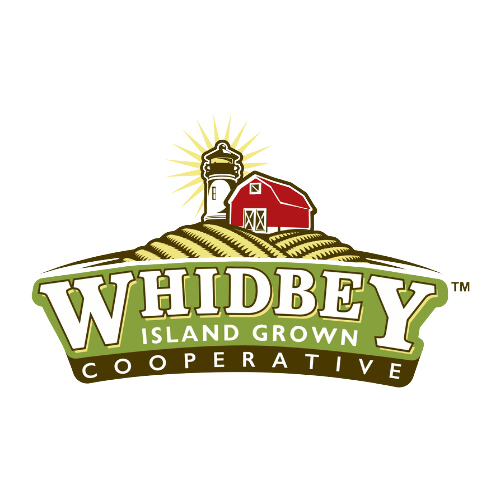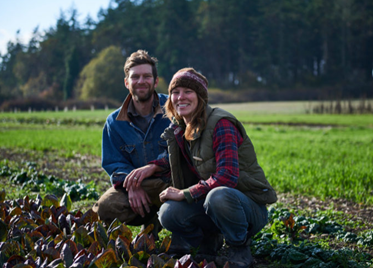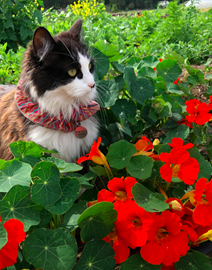Deep Harvest Farm
Portland transplants Annie Jesperson and Nathaniel Talbot made the journey up to the Organic Farm School in 2009 to learn the art of small scale agriculture, and have been operating their certified-organic seed, vegetable, and flower farm for ten years now.
We asked Annie and Nathaniel a series of questions about their farm. Read on to learn more about one of your local producers!
Why do you farm?
Annie - Nathaniel and I farm for different reasons, but I think that we are both passionate about caring for the earth and caring for people. Farming allows us to do both of those things. I’ve always been attracted to farming because I grew up with a whole lineage of farmers from North Dakota. Looking at my family tree, there are generations of farmers except for my parents. It is part of my background identity and I’ve always loved spending time on my family’s farms. In North Dakota, farming wasn’t a likely profession if you went to college. Young women typically wouldn’t head that route. I personally love farming for being an unequivocal objective good. People need to eat, and people need to eat good things. We farm in a way that is looking out for soil life, pollinators, and wildlife. Being farmers allows us to implement all kinds of our values into our jobs.
Nathaniel - I love working with nature, outdoors and being exhausted and fulfilled at the end of the day.
Deep Harvest’s Farming Practices:
We are Certified Organic but try to go quite a bit beyond what that means. Every year, we increase the perennials on our property, especially hedgerow plantings, along with native shrubs and trees, to help with the issue of carbon in the atmosphere. We’ve planted a lot of crops that don’t require much tilling, such as artichokes, asparagus, and rhubarb. Cover cropping is a big passion of ours - we are always trying to build organic matter in our soils and feed the soil life.
We strive to provide as much habitat for pollinators and wildlife on the farm as possible. By farming along with nature instead of against it, we aim to regenerate the land and soil. We don’t use any pesticides or herbicides. We have a solar-powered electric tractor that we use for cultivation. We are always trying to find ways to build technologies into our farm that are less impactful on the earth.
What's growing at Deep Harvest?
Annie - We have around 40 different food crops growing, and over a hundred varieties of crops growing for seed.
As a seed farm, we are always picking a dozen crops that we trial each year to then find the best variety to grow for seed the following year. We like to offer seed crops that do well in our region that we can feel passionate about. We grow a crazy number of varieties. We pretty much grow every crop that grows easily in the Northwest. We try to provide a diverse CSA for our members.
People get super excited about our carrots (which we will be offering frequently through the food hub) because they are noticeably different from the grocery store. Because they are not sitting on the shelf for a while, they are extra sweet, crunchy, and have an increased nutritional value.
Favorite crop to grow?
Annie - “If people haven’t had roasted beets, they haven’t lived.” For the ten years that I’ve been farming, my favorite crop has been beets. I love all the tasks associated with growing beets - thinning them, harvesting them… they are nutrient dense and you can eat the greens. You can’t argue with roasting beets but if I’m going to be fancier, I like steaming them, flattening them, then frying them in some balsamic and olive oil. You can put a smashed beet on top of a spinach salad or eat it as a side dish. I think it’s both delicious and beautiful.
Nathaniel’s favorite crop is winter squash, and he likes it baked and then slightly broiled until crispy.
How has the Food Hub impacted Deep Harvest?
We appreciate having another outlet for crops that are in excess. The flexibility of the food hub is nice and the pick-up location right down the road from us is super convenient.
Community involvement:
Annie - We like to be plugged into the community. I’m on the board of Good Cheer Food Bank and Nathaniel is on the Food Resiliency Consortium Committee with Goosefoot. We are both on a working group with folks from the land trust, conservation district, and farm school that is looking at ways to get more farmers on available land and figuring out how to keep land from development and keep it in farming. We’ve done a variety of things with local politics in the past. For example, we host events for county candidates that care about farming and environmental issues. We do our best to support local nonprofits on the island i.e. grow crops intentionally for Good Cheer Food Bank during the winter months. We have a lot of social things that we do to stay involved in the community. Nathaniel is a musician, so we plug in that way. We also have folks that do work/trade for our CSA.
Fun Facts about Deep Harvest:
Favorite musician/song:
Annie - Lucinda Williams (Song: Fruits of my Labor)
Nathaniel - Elliott Smith, Kelly Joe Phelps, Bill Frisell
Favorite TV show:
Annie - Big Little Lies
Nathaniel - Black Mirror, Succession, Ozark
Hobbies outside of farming:
Annie - running, ocean swimming (new big passion), hiking, cooking, reading, a little guitar
Nathaniel - music, birding, frisbee, hiking/backpacking, running
Favorite spot on the island:
Annie - Trillium Woods
Nathaniel - Deer Lagoon, Admiralty Inlet
You can buy from Deep Harvest Farm online on their website, and in many south Whidbey stores and restaurants including Payless and the Star Store. A list of where to find their produce and seed racks is available here. Their produce is also available on the Food Hub here.
Producer Feature by Rachel Joseph





